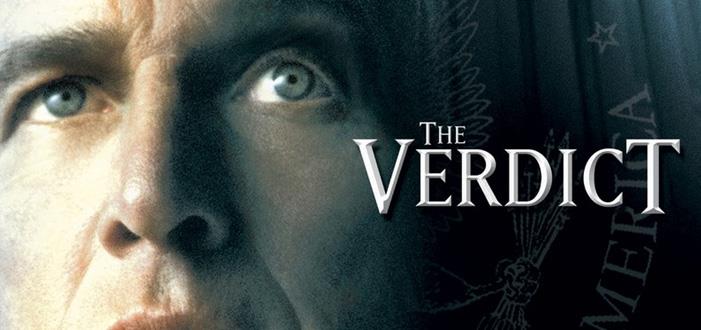
The Verdict
What happens when winning matters more than justice? When a grievance cannot be repaired because the nature of the human being and his society will always have the tendency of regressing downwards towards the simian? Is that called injustice, when there is no voluntary agreement on the resolution of a troubling matter, as in the case with The Verdict?
It’s actually surprising how tepid the namesake is in the film, suggesting of course that the decision reached by a jury is simply the tip of the iceberg of a drama. But it’s unfortunate that the film does not reach more into the depths of the main lawyer in the film played by Paul Newman. It is not to say it glosses over his history of being mutilated by the reality of the practice of law in humanity compared to its ideal. It simply does not attach us as viewers to his zealotry toward a higher path than one which sends a star witness who claims to want to do the right thing but then favors a vacation in the Caribbean when his opportunity surfaces.
It is indeed a Christian virtue to suffer for aspiring to a higher walk of being, as this is the model set by Christ. And we see it with this poor ambulance chaser who has been shipwrecked ever since he tried doing the right thing in a world that is too myopic to care for what it will become. And here is the striking feat of comparing a next world, indeed an after-life, with a future world given to posterity, versus an other-world that transcends the realm of human mortality. Here, seen in the film’s struggle with the concept of justice is the struggle of man himself and his ultimate condition, the problem of his free will. The problem, in other words, of acting above his animal form or acting as it incarnated. Acting as an animal is necessary to survive. After all, man needs to eat and have sex. But concentrating on creating an animal life is too concentrated on impetuous demands. What is noble for man is in his ability to transcend this immediate reality, to abstract and therefore rationalize and furthermore reason a world that has yet to be. Yet it is this world that is beyond his immediacy that the animal cannot grasp, for while it necessarily exists as a condition of the physical world which he has yet to experience or be in, contemplating its reality does not reward anything in the here and the now. And yet, the great mortals of humanity occupy this realm for this exact reason; they transcend what is animal in man to the benefit of all mankind – it is indeed an act of elevating the human condition.
The lawyer’s struggle, while personal, is also a heroic exemplification of this tension in mankind. And this is what his closing remarks to the jury allude to: that they have a chance to do something right. It does not matter that some or even most men will fail to seize the opportunity, as the notorious vacationing doctor demonstrates. It simply takes a vigilant few to surpass the mark set by their forefathers to keep the momentum of man in the direction of Providence rather than Perdition. This is called heroism.
Grade: A

